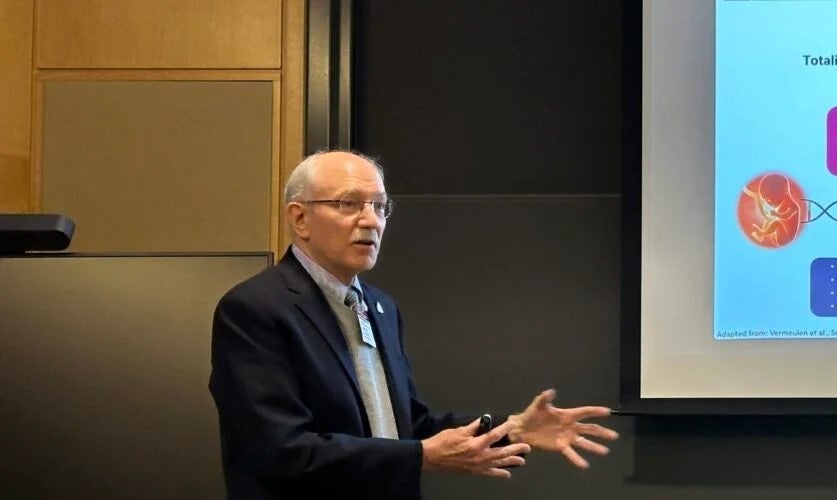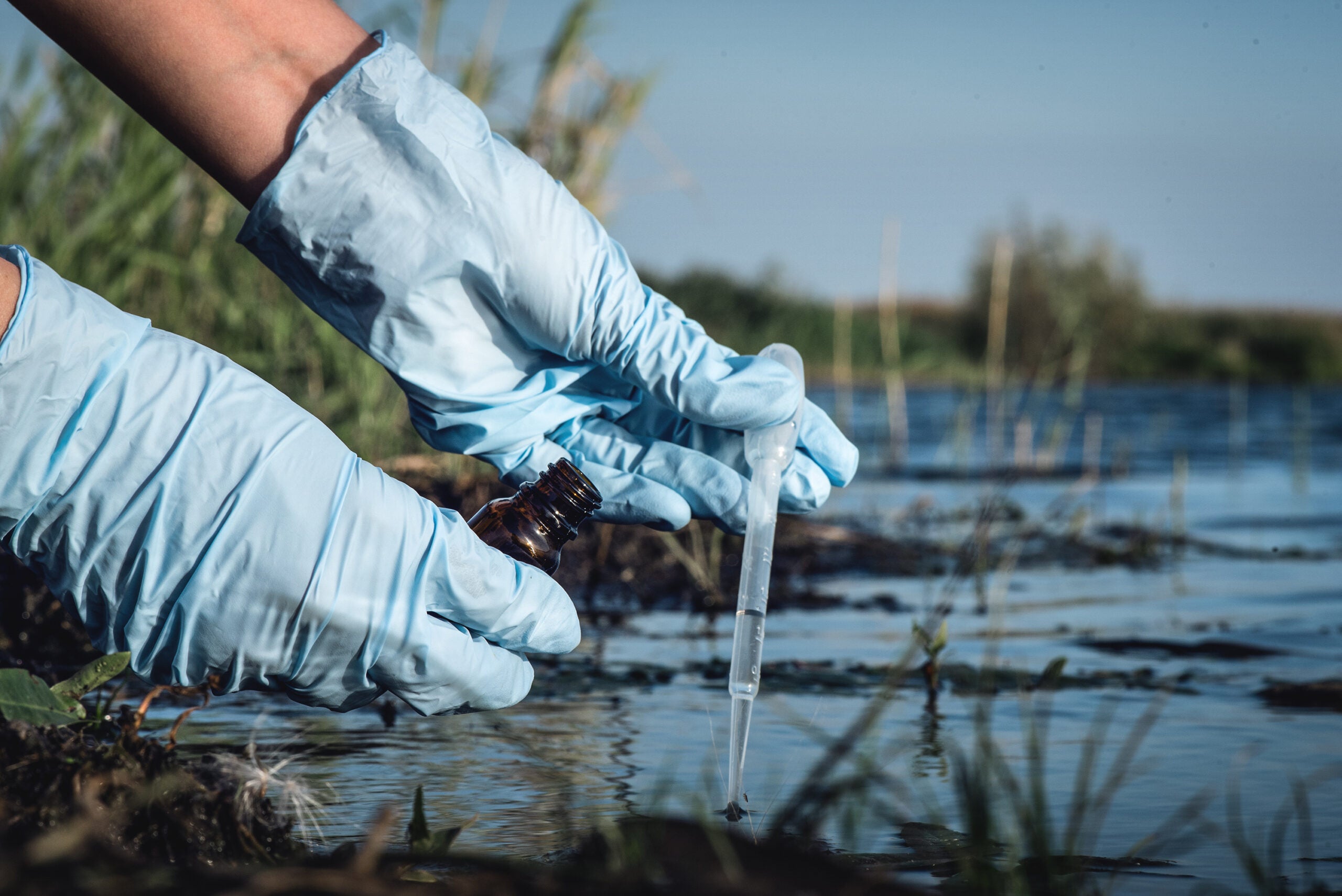Department of Environmental Health
We’re leading the global charge to understand and solve the world’s most pressing environmental health challenges. Learn how we can make an impact together.
665 Huntington Avenue, Building 1, Room 1301
Boston, MA 02115
Research Centers and Labs
The Department of Environmental Health at the Harvard T.H. Chan School of Public Health is at the forefront of research on the most pressing public health issues in 21st century society. Our faculty, students, and researchers span the world and unite in the shared mission and commitment to improving global public health.
Our research addresses the most important environmental health challenges of our time including the health impacts of climate change; plastics, metals, and other toxins; air pollution, occupational hazards; and more.
Learn more about Environmental Health Research Centers, Faculty Labs, and Working Groups below.
Research Centers

Apple Women's Health Study
In the first study of its kind, the Harvard T.H. Chan School of Public Health has teamed up with Apple and the National Institute of Environmental Health Sciences (NIEHS) to gain a deeper…

Center for Climate, Health, and the Global Environment (C-CHANGE)
Harvard Chan C-CHANGE makes climate change personal by connecting it to health and highlighting how climate solutions can provide for a healthier and more just world.

Center for Climate: Equitable & Accessible Research-based Testing for Health (C-EARTH)
C-EARTH brings together experts from different fields to develop solutions that address both personal and policy-level issues related to climate risks to health.

Education and Research Center (ERC) for Occupational Safety & Health
The Harvard Chan ERC has played a prominent role in preparing leaders in the arena of occupational safety and health. Graduates are employed in industry, insurance, labor,

Harvard Chan–NIEHS Center for Environmental Health
NIEHS Center for Environmental Health is dedicated to re-envisioning the exposure environment and the integrated effects of on people and place to better understand the impact of exposure on human…

Healthy Buildings
Our research studies covering topics related to healthy buildings is driving new conversations – and driving the healthy building movement forward.

John B. Little Center for Radiation Sciences
The JBL Center supports cutting edge biological, physical and population-based epidemiological research to understand, interpret, and estimate the health effects of radiation.

University of Rhode Island/Harvard T.H. Chan School of Public Health STEEP Superfund Center
The STEEP Superfund Center aims to discover how PFASs move through the environment, how people can be exposed through drinking water, and how the compounds impact health.
Faculty Labs
The Allergy, Climate, and Exposomics (ACE) Lab studies how environmental exposures impact our immune system and our overall health. We research these topics through the lens of climate change, the number one threat to global public health. The lab is led by Dr. Kari Nadeau, Chair of the Department of Environmental Health.
Most chronic diseases are the result of both environmental exposures and genetic factors. The majority of cancers and other chronic diseases, such as chronic obstructive lung disease, asthma, and cardiovascular diseases, are a few examples. The Christiani Lab studies the interplay between environmental exposures, genetics and disease in human populations. This area of endeavor is molecular epidemiology.
The Gao Lab at Harvard T.H. Chan School of Public Health investigates the complex interactions between environmental exposures (collectively known as the exposome) and human health.
Research in our group uses statistical analysis and machine learning approaches to understand asthma at both mechanistic and population health levels. Asthma is a chronic disease of the lungs that affects an estimated 1 in 20 people worldwide, and in the USA it is also amongst the diseases with the largest disparities driven by race and socioeconomic class. Our research therefore pursues two directions: applying mucosal immunology to understand its molecular mechanisms to work towards improved diagnosis and treatment, and understanding its environmental causes to prevent disease-causing exposures which perpetuate disparities.
The Hauser Lab’s research focuses on reproductive, perinatal, and pediatric epidemiology. Dr. Hauser led the NIH-funded Environment and Reproductive Health (EARTH) Study in collaboration with physicians and staff from Massachusetts General Hospital, Harvard Medical School. He is also conducting an NIH-funded study on the effect of maternal and paternal preconception exposures to environmental chemicals on children’s health. The goal of our research is to increase understanding of the health effects of chemical exposures so healthcare and public health professionals can use this information to educate the public, guide government policies, and improve patient care.
Dr. Kales’ primary research focuses on the health of firefighters and other public safety professionals: US firefighters are a working population at risk of chronic diseases, including obesity, cardiovascular disease, and cancer. The Kales Lab and Firefighter Studies have provided seminal contributions in the clinical epidemiology of cardiovascular events in firefighters and has become most influential in determining the causal relationship of heart disease among firefighters to their job activities, as well as investigating interventions to mitigate these risks. The lab is led by Dr. Stefanos N. Kales, Professor in the Department of Environmental Health.
The environment has an enormous impact on human health, and exposures to environmental toxicants can lead to the development of a myriad of diseases. The overall goal of research at the Lu Lab is to understand the complex gene-environment interactions that are critically involved in diseases relevant to public health. The lab is led by Quan Lun, Cecil K. and Philip Drinker Professor of Environmental Physiology in the Department of Environmental Health.
The Mahalingaiah Lab strives to better understand diseases that affect women throughout the lifespan, advancing reproductive health knowledge with thorough research. The lab is led by Dr. Shruthi Mahalingaiah, assistant professor of environmental, reproductive, and women’s health in the Department of Environmental Health.
The Park Lab investigates the role of airway epithelial cells in homeostasis and disease. As the primary barrier against external stimuli—ranging from environmental pollutants and allergens to bacteria and viruses—the airway epithelium serves as the first line of defense for respiratory health. The lab is led by Dr. Jin-Ah Park, Associate Professor of Airway Biology in the Department of Environmental Health.
The Sarosiek Laboratory pursues research focusing on a fundamental question that has broad implications for health and disease: What determines whether a cell will live or die in response to damage or stress? Broadly, the Lab seeks to understand how the regulation of apoptosis (programmed cell death) in healthy as well as diseased cells affects their sensitivity to damage or stress. The lab is led by Dr. Kristopher Sarosiek, Assistant Professor of Radiation Biology in the Department of Environmental Health.
The Spatial and Contextual Exposomics and Epidemiology Laboratory (SpaCE2 Lab), based at the Harvard TH Chan School of Public Health, the Channing Division of Network Medicine at Brigham and Women’s Hospital, the Harvard Pilgrim Health Care Institute, and Harvard Medical School, broadly focuses on the impact of location-based exposures on health. The lab is led by Dr. Francine Laden, Dr. Jaime E Hart, and Dr. Peter James.
Working Groups

Environmental Statistics Working Group
The Environmental Statistics Working Group examines statistical issues related to environmental data and, in particular, the environmental effects on human health.

Exposure Biology Working Group
The Exposure Biology Working Group develops and applies quantitative tools to study the relationship between exposure, dose, and response.